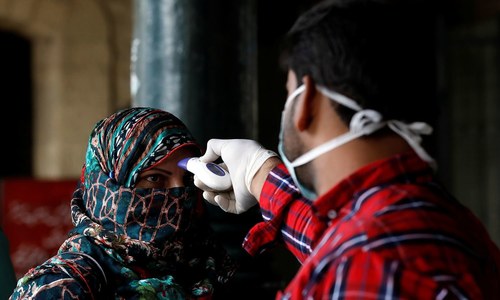PESHAWAR: The health department is struggling to increase coronavirus vaccination rate and ensure the enforcement of smart lockdowns in the province amid the growing detection of Delta, Alpha and Beta strains of the virus, insist officials.
The officials told Dawn that the health department had sent samples of 50 Covid-19 confirmed cases to the National Institute of Health, Islamabad, for gene sequencing and 16 of them were found to be Delta variant and five Alpha one.
They said the NIH had confirmed eight cases of Alpha, Beta and Delta variants of the virus last month.
According to Vice-Chancellor of the Khyber Medical University Prof Ziaul Haq, Delta variant is spreading in the community fast and has been found in some vaccinated or previously infected people as well.
NIH detects 16 cases of Delta strain, five of Alpha in KP
“Alpha variant was detected in three women aged 17-22 years and two men aged 27-30 years and delta in six women aged 16-50 years and 10 men of 24-70 years in Peshawar. This shows that the Delta variant is the predominant in the region,” he told Dawn.
Prof Zia said the people vaccinated against the virus had reported significantly lower Covid incidence, including that of Delta variant, and that the infected ones had mild-to-moderate symptoms compared to unvaccinated ones.
“The message is loud and clear: the people should get vaccine shots and ensure the vaccination of their families, friends, neighbours, servants and others around them at the earliest regardless of their history of infection, comorbidity, age or antibodies status before it’s too late,” he said.
The VC said that was the only way to handle the pandemic successfully to return to normal life.
He said the KMU recently acquired the Sanger Sequencer to identify Covid-19 variants, which were not previously reported or included in the PCR kit.
“Any new variant circulating in the local population will be identified rapidly,” he said.
Prof Zia said his university had prepared itself to test 3,000 coronavirus cases in one year and also acquired the capacity to perform the ‘whole genome sequencing’, the most advanced sequencing technique.
“The technique can identify any change in the entire genome of the virus. Due to the high expenses involved i.e. around Rs50,000 per patient, the laboratory has reserved this technique for samples highly suspicious of mutations such as having high mortality rate, sudden increase in the number of cases or post-vaccination infection cases,” he said.
The VC said since the outbreak of Covid-19 in the province, the KMU had been on the forefront of the disease investigation and response.
“We have the province’s largest laboratory with the daily testing capacity of 4,000. It has performed more than 800,000 tests in the last 15 months,” he said.
Meanwhile, the health department’s officials said the situation was precarious following the detection of more and more delta, alpha and other variants of the virus.
They said the department was following a double-pronged strategy to enhance vaccination rates and enforcing smart lockdowns in the areas reporting those cases.
The officials said the National Command and Operation Centre (NCOC) had recommended smart and mini lockdowns in the infected areas following the emergency of foreign variants to stop its transmission.
“The NCOC isn’t going to impose complete lockdown during Eid days but has issued certain guidelines to ensure standard operating procedure and interrupt spread of the virus. We banked heavily on the district administration to implement the precautionary steps,” an official told Dawn.
He said the area from where the minimum five cases were reported would face mini-lockdown under which a few houses would be closed, whereas in case of 10 or more positive patients, smart lockdown would be enforced in one or few streets.
The official said currently, some Peshawar areas were placed under smart lockdown in view of the confirmed cases.
He said the department had received 750,000 more doses of SinoVac and were vaccinating 80,000 people against the virus in the province daily against the target of 65,000 people.
Published in Dawn, July 18th, 2021













































Dear visitor, the comments section is undergoing an overhaul and will return soon.